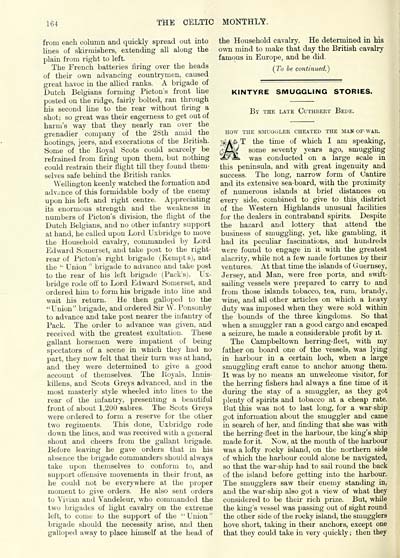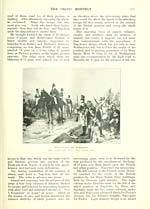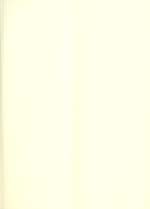Blair Collection > Celtic monthly > Volume 5, 1897
(236)
Download files
Complete book:
Individual page:
Thumbnail gallery: Grid view | List view

164
THE CELTIC MONTHLY.
from each column and quickly spread out into
lines of skirmishers, extending all along the
plain from right to left.
The French batteries tiring over the heads
of their own advancing countrymen, caused
great havoc in the allied ranks. A brigade of
Dutch Belgians forming Picton's front line
posted on the ridge, fairly bolted, ran through
his second line to the rear without firing a
shot; so great was their eagerness to get out of
harm's way that they nearly ran over the
grenadier company of the 2Sth amid the
hootings, jeers, and execrations of the British.
Some of the Royal Scots could scarcely be
refrained from fii'ing upon them, but nothing
could restrain their flight till they found them-
selves safe behind the British ranks.
Wellington keenly watched the formation and
advance of this formidable body of the enemy
upon his left and right centre. Appreciating
its enormous strength and the weakness in
numbers of Picton's division, the flight of the
Dutch Belgians, and no other infantry support
at hand, he called upon Lord Uxbridge to move
the Household cavalry, commanded by Lord
Edward Somerset, and take post to the right-
rear of Picton's right brigade ( Kempt s), and
the '• Union " brigade to advance and take post
to the rear of his left brigade (Pack's). Ux-
bridge rode ofi' to Lord Edward Somerset, and
ordered him to form his brigade into line and
wait his return. He then galloped to the
"Union" brigade, and ordered Sir \V. Ponsonby
to advance and take post nearer the infantry of
Pack. The order to advance was given, and
received with the greatest exultation. These
gallant horsemen were impatient of being
spectators of a scene in which they had no
part, they now felt that their turn was at hand,
and they were determined to give a good
account of themselves. The lioyals, Linis-
kiUens, and Scots Greys advanced, and in the
most masterly style wheeled into lines to the
rear of the infantry, presenting a beautiful
front of about 1,200 sabres. The Scots Greys
were ordered to form a reserve for the other
two regiments. This done, Uxbridge rode
down the lines, and was received with a g(;neral
shout and cheers from the gallant brigade.
Before leaving he gave orders that in his
absence the brigade commanders should always
take ujjon themselves to conform to, and
support oli'ensive movements in their front, as
he could not be everywhere at the proper
moment to give orders. He also sent orders
to Vivian and Vandeleur, who commanded the
two brigades of light cavaky on the extreme
left, to come to the support of the "Union"
brigade should the necessity arise, and then
galloped away to place himself at the head of
the Household cavalry. He determined in his
own mind to make that day the British cavalry
famous in Europe, and he did,
(7'o be continued.)
KINTYRE SMUGGLING STORIES.
By the late Cuthbeet Bede.
HOW THE SirUOGLER CHEATED THE MAN OF WAR.
•g^J^ T the time of which I am speaking,
A^^ some seventy years ago, smuggling
JP^i^ was conducted on a large scale in
this peninsula, and with great ingenuity and
success. The long, narrow form of (Jantire
and its extensive sea-board, with the proximity
of numerous islands at brief distances on
every side, combined to give to this district
of the Western Highlands unusual facilities
for the dealers in contraband spirits. Despite
the hazard and lottery that attend the
business of smuggling, yet, like gambling, it
had its peculiar fascinations, and hundreds
were found to engage in it with the greatest
alacrity, while not a few made fortunes by their
ventures. At that time the islands of Guernsey,
Jersey, and Man, were free ports, and swil't-
sailing vessels were prepared to carry to and
from those islands tobacco, tea, rum, brandy,
wine, and aU other articles on which a heavy
duty was imposed when thej' were sold within
the bounds of the three kingdoms. So that
when a smuggler ran a good cargo and escaped
a seizure, he made a considerable profit by it.
The Campbeltown herring-fleet, with my
father on board one of the vessels, was lying
in harbour in a certain loch, when a large
smuggling craft came to anchor among them.
It was by no means an imwelcome visitor, for
the herring fishers had always a fine time of it
during the stay of a smuggler, as they got
jsleutj' of spirits and tobacco at a cheap rate.
But this was not to last long, for a war-ship
got information about the smuggler and came
in search of her, and finding that she was with
the herring-fleet in the harbour, the king's ship
made for it. Now, at the mouth of the harbour
was a lofty rocky island, on the northern side
of which the harbour could alone be navigated,
so that the war-shii) had to sail round the back
of the island before getting into the hai'bour.
The smugglers saw their enemy standing in,
and the war-ship also got a view of what they
considered to be their rich prize. But, while
the king's vessel was passing out of sight round
the other side of the rocky island, the smugglers
hove short, taking in their anchors, except one
that they could take in very quickly ; then they
THE CELTIC MONTHLY.
from each column and quickly spread out into
lines of skirmishers, extending all along the
plain from right to left.
The French batteries tiring over the heads
of their own advancing countrymen, caused
great havoc in the allied ranks. A brigade of
Dutch Belgians forming Picton's front line
posted on the ridge, fairly bolted, ran through
his second line to the rear without firing a
shot; so great was their eagerness to get out of
harm's way that they nearly ran over the
grenadier company of the 2Sth amid the
hootings, jeers, and execrations of the British.
Some of the Royal Scots could scarcely be
refrained from fii'ing upon them, but nothing
could restrain their flight till they found them-
selves safe behind the British ranks.
Wellington keenly watched the formation and
advance of this formidable body of the enemy
upon his left and right centre. Appreciating
its enormous strength and the weakness in
numbers of Picton's division, the flight of the
Dutch Belgians, and no other infantry support
at hand, he called upon Lord Uxbridge to move
the Household cavalry, commanded by Lord
Edward Somerset, and take post to the right-
rear of Picton's right brigade ( Kempt s), and
the '• Union " brigade to advance and take post
to the rear of his left brigade (Pack's). Ux-
bridge rode ofi' to Lord Edward Somerset, and
ordered him to form his brigade into line and
wait his return. He then galloped to the
"Union" brigade, and ordered Sir \V. Ponsonby
to advance and take post nearer the infantry of
Pack. The order to advance was given, and
received with the greatest exultation. These
gallant horsemen were impatient of being
spectators of a scene in which they had no
part, they now felt that their turn was at hand,
and they were determined to give a good
account of themselves. The lioyals, Linis-
kiUens, and Scots Greys advanced, and in the
most masterly style wheeled into lines to the
rear of the infantry, presenting a beautiful
front of about 1,200 sabres. The Scots Greys
were ordered to form a reserve for the other
two regiments. This done, Uxbridge rode
down the lines, and was received with a g(;neral
shout and cheers from the gallant brigade.
Before leaving he gave orders that in his
absence the brigade commanders should always
take ujjon themselves to conform to, and
support oli'ensive movements in their front, as
he could not be everywhere at the proper
moment to give orders. He also sent orders
to Vivian and Vandeleur, who commanded the
two brigades of light cavaky on the extreme
left, to come to the support of the "Union"
brigade should the necessity arise, and then
galloped away to place himself at the head of
the Household cavalry. He determined in his
own mind to make that day the British cavalry
famous in Europe, and he did,
(7'o be continued.)
KINTYRE SMUGGLING STORIES.
By the late Cuthbeet Bede.
HOW THE SirUOGLER CHEATED THE MAN OF WAR.
•g^J^ T the time of which I am speaking,
A^^ some seventy years ago, smuggling
JP^i^ was conducted on a large scale in
this peninsula, and with great ingenuity and
success. The long, narrow form of (Jantire
and its extensive sea-board, with the proximity
of numerous islands at brief distances on
every side, combined to give to this district
of the Western Highlands unusual facilities
for the dealers in contraband spirits. Despite
the hazard and lottery that attend the
business of smuggling, yet, like gambling, it
had its peculiar fascinations, and hundreds
were found to engage in it with the greatest
alacrity, while not a few made fortunes by their
ventures. At that time the islands of Guernsey,
Jersey, and Man, were free ports, and swil't-
sailing vessels were prepared to carry to and
from those islands tobacco, tea, rum, brandy,
wine, and aU other articles on which a heavy
duty was imposed when thej' were sold within
the bounds of the three kingdoms. So that
when a smuggler ran a good cargo and escaped
a seizure, he made a considerable profit by it.
The Campbeltown herring-fleet, with my
father on board one of the vessels, was lying
in harbour in a certain loch, when a large
smuggling craft came to anchor among them.
It was by no means an imwelcome visitor, for
the herring fishers had always a fine time of it
during the stay of a smuggler, as they got
jsleutj' of spirits and tobacco at a cheap rate.
But this was not to last long, for a war-ship
got information about the smuggler and came
in search of her, and finding that she was with
the herring-fleet in the harbour, the king's ship
made for it. Now, at the mouth of the harbour
was a lofty rocky island, on the northern side
of which the harbour could alone be navigated,
so that the war-shii) had to sail round the back
of the island before getting into the hai'bour.
The smugglers saw their enemy standing in,
and the war-ship also got a view of what they
considered to be their rich prize. But, while
the king's vessel was passing out of sight round
the other side of the rocky island, the smugglers
hove short, taking in their anchors, except one
that they could take in very quickly ; then they
Set display mode to: Large image | Transcription
Images and transcriptions on this page, including medium image downloads, may be used under the Creative Commons Attribution 4.0 International Licence unless otherwise stated. ![]()
| Early Gaelic Book Collections > Blair Collection > Celtic monthly > Volume 5, 1897 > (236) |
|---|
| Permanent URL | https://digital.nls.uk/75853590 |
|---|
| Shelfmark | Blair.57 |
|---|---|
| Additional NLS resources: | |
| Attribution and copyright: |
|
| Description | A selection of books from a collection of more than 500 titles, mostly on religious and literary topics. Also includes some material dealing with other Celtic languages and societies. Collection created towards the end of the 19th century by Lady Evelyn Stewart Murray. |
|---|
| Description | Selected items from five 'Special and Named Printed Collections'. Includes books in Gaelic and other Celtic languages, works about the Gaels, their languages, literature, culture and history. |
|---|

